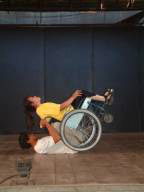Using the ‘arts’ in inclusion, Cambodia
Katie MacCabe
Epic Arts, a UK-based trust, runs arts programmes for people of all abilities and disabilities. In 2003 Katie, the Co-ordinator of Epic Arts, moved to Cambodia – a country recovering from many years of civil war. Here she explains the importance of art and how it can promote inclusion.
It was an interesting beginning and we were a challenging group, to say the least! Four dancers and a guest choreographer. We were working with three different languages, Khmer, English and Khmer Sign Language, and two extremely different cultures. We soon realised that words would hold us back. We needed to find a new language – the universal language of creative play – to listen and speak with our bodies using the language of trust and interdependence.
Over the last year we have created performance pieces with ‘dis’abled and ‘able’ youth and adults from a variety of ‘dis’advantaged backgrounds. We have taken performances to schools, conferences and theatres. It has been exciting as the idea of inclusion is still in the early stages. The concept of bad Karma means that people with disability are often seen as outcasts: their disabilities reflecting sins in previous lives.
Dance is a powerful visual tool for celebrating our differences and demonstrating our abilities. It challenges society’s perception of ‘dis’ability. So often, people are ‘dis’abled by society’s views of them. They grow up believing that they ‘can’t’. We hope that through workshops we can encourage people to discover that they ‘can’.
‘Through “art”, our small isolated lives … can be joined…’
Jane Wagner
Epic Arts works from the principal of joining lives: using arts for integration and inclusion. My father was disabled so I was brought up with disability as the norm, but found I knew no one of my age with disability. This troubled me, and the idea came that ‘art’ is a good way to bring integration. In 1998 I saw an inspiring performance by ‘dis’abled and able-bodied members of Candoco Dance company, who tour internationally and run workshops on integration. The two founders of Candoco include a former professional dancer who had an accident on stage. They were an inspiration to me, and I trained with them for about two years. In 2000 the idea of Epic Arts was born after chatting with two colleagues, one of whom had a sister with Down’s Syndrome.
In the UK we link children from mainstream schools and schools for children with disabilities and special needs. They work together for a week and develop a creative movement performance. The results are profound every time. Children from the mainstream school sit in a huddle, wide-eyed, as some children are wheeled in, others are on crutches. We push all the metal aside and start to work; meeting as people, as friends. By the end of the week, there is no longer distance between the two groups, but hugs and tears when it is time to part. Through art everyone can find a common language. Creating a performance together brings with it a sense of unity and togetherness.
‘There is no disability in art,’ said someone who saw a performance recently. It is exciting seeing people who are usually stared at with pity, being watched with awe as proud performers. Using the arts can help promote inclusion by:
- learning to work together and to trust each other, as a performance is developed
- challenging and changing the attitudes of those watching.

The photograph shows two Epic Arts performers, Nhin Sophara, a deaf performance artist, and Kim Sathia, a former professional dancer. Since Sathia became paralysed after car crash seven years ago, she has not danced. Last month she returned to the stage, and we hope there is a lot of dancing still to be done. She is a strong role model for young disabled Cambodians. She has not let her disability stop her from integrating back into the arts world.
Contact:
Katie MacCabe
Epic Arts
PO Box 174
Phnom Penh
Cambodia
Email: epicarts@forum.org.kh
Website: www.epicarts.org.uk
